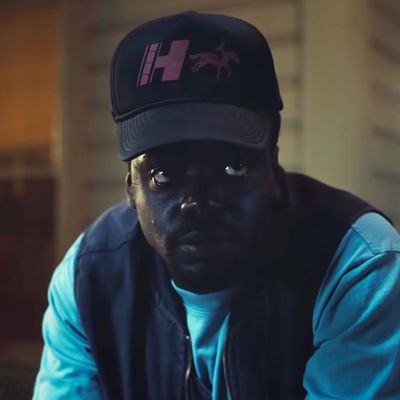
The first reactions to Jordan Peele’s latest horror flick are in, and so far not one of them is a thirsty ode to stars Daniel Kaluuya and Steven Yeun? Okay, okay, let’s get serious for a second. Nope is Peele’s highly anticipated third feature — his first 2017 social thriller, Get Out, was a runaway hit, while the horror movie Us, though more divisive, managed to avoid a sophomore slump two years later — and critics are divided. Based on the first reviews, Nope delves into the scams of representation, the dangers of Hollywood’s glimmer, and our country’s increasing numbness to violence. While critics overwhelmingly praise the film’s eerie and expansive cinematography from IMAX master Hoyte van Hoytema, some reviews find the plotting oversaturated yet thinly sketched. Others find the sibling dynamic between Kaluuya and Keke Palmer’s characters lacking chemistry, while Yeun’s Ricky “Jupe” Park deserves a separate movie to carefully explore his psyche. It’s either Peele’s Jaws or an enjoyable entry to an otherwise brilliant career. Here are the early takeaways.
“Nope is a work of sly devastation from writer-director Jordan Peele that, like his previous films Get Out and Us, is a horror comedy with a speculative premise — in this case, by way of the saucer-shaped UFO lurking in the clouds about the Haywood Ranch in Agua Dulce. Unlike in Get Out, where Kaluuya’s character Chris discovers he’s been lured into a trap by a cabal of body-snatching white liberals, or Us, where malevolent doppelgängers swarm out of the earth like collectors coming for a long-overdue bill, in Nope, the danger is, to a certain degree, opt-in. The title is a slasher-movie joke, a sentiment to be howled at characters who traipse obliviously to their doom by venturing into unlit basements or following mysterious sounds into the woods.” — Alison Willmore, Vulture
“Even when parts of it don’t gel, Nope is a rapturous watch. This film, about a pair of sibling horse wranglers who encounter an uncanny force on their ranch, covers a wide range of themes: Hollywood’s obsession with and addiction to spectacle, the United States’ inurement to violence, the siren call of capitalism, the legacy of the Black cowboy, and the myth of the American West. Aided by a strong cast, led impressively by Daniel Kaluuya, Keke Palmer, Steven Yeun, and Brandon Perea, Peele plunges us into a cavernous, twisted reality.” — Lovia Gyarkye, The Hollywood Reporter
“This weird and wild Californian expanse is the thrillingly charged setting of Nope, a film that does for open skies what Jaws did for the beach, and The Wicker Man for Hebridean getaways. The third feature from Jordan Peele, the director of Get Out and Us, it repeats the winning recipe of those superb earlier works: a hugely entertaining surface with rich and troubling substance bubbling underneath. It’s a summer blockbuster which hauls the genre right back to its 1970s New Hollywood roots — a Close Encounters of the Third Kind with the Spielbergian warmth and wonder swapped for skin-prickling disquiet and mordant satirical wit.” — Robbie Collin, the Telegraph
“There are plenty of bold and riveting images in Nope; bizarre dreamlike iterations. Kaluuya and Palmer have, singly, a cool self-possession and address to the camera, but no really compelling chemistry as siblings or anything else. There is something clotted and heavy about this film, with sadly not enough of the humour for which Peele justly became celebrated in his double-act days with Keegan-Michael Key. It’s not the positive response I wanted to have.” — Peter Bradshaw, The Guardian
“Nope seems to want to call out the failures of modern media while also reveling in its capacity. At least Peele’s version is not empty maximalism, unlike so much other entertainment and manipulated reality rushing at us at all times. There are real ideas in Nope, albeit ones that frequently circle back on themselves, that exist in confusing contradiction to one another. Such confusion is certainly the prerogative of — and even welcomed in — a film as dense as this one. But Nope’s concluding minutes don’t bring the film to any satisfying place; it hurries to an ending in a way that suggests many minutes, if not hours, of movie left on the cutting-room floor.” — Richard Lawson, Vanity Fair
“While Jordan Peele has fast become one of the most relevant and profitable of modern American filmmakers, Nope is the first time that he’s been afforded a budget fit for a true blockbuster spectacle, and that’s exactly what he’s created with it. But if this smart, muscular, and massively entertaining flying saucer freak-out is such an old-school delight that it starts with a shout-out to early cinema pioneer Eadweard Muybridge (before paying homage to more direct influences like Close Encounters of the Third Kind), it’s also a thoroughly modern popcorn movie for and about viewers who’ve been inundated with — and addicted to — 21st-century visions of real-life terror.” — David Ehrlich, IndieWire
“Nope itself starts flying off in different directions. It’s part of the film’s design — and, in a way, its racial consciousness — that OJ and Emerald are too mistrustful of mainstream white society to get any authorities involved. So we’re spared the sort of meddlesome-U.S.-government boilerplate plot that weighed down a movie like Arrival. Yet Nope doesn’t have a plot so much as a series of happenings that spill out in an impressionistic and arbitrary way. Logic often takes a back seat, and that has the unfortunate effect of lessening our involvement.” — Owen Gleiberman, Variety
“In Jordan Peele’s Nope, a UFO sighting provides an exploration of the predatory side of the entertainment industry, while becoming something else entirely in Peele’s hands. Nope is Peele at his most imaginative, a story of two characters who refuse to be pinned down from a director who refuses the same. It’s a big, surprising evolution of the classic Hollywood UFO story in properly cosmic dimensions. It’s great, and whatever you’re expecting, you’ll likely be wrong.” — Jeff Ewing, Forbes
“Nope isn’t a particularly scary UFO film but is effectively unnerving. Peele plays with his audience in devilish ways before going big and bold with the visuals (particularly Hoyte van Hoytema’s dazzling cinematography) as well as the white-knuckle tension. Just don’t go in expecting Get Out or Us: Peele’s first two standouts are focused in human explorations, whereas Nope is more scattershot with its storytelling. The filmmaker touches on an array of subplots and intriguing ideas (the dangerous indifference of show business, mankind’s disparate reactions to a life-altering situation) but attempts too many between a visceral, gripping first half and the more conventional and rousing second.” — Brain Truitt, USA Today
“While Nope might not be as overt in its messaging as Get Out or Us, Peele explores ideas about the beauty of filmmaking and practical effects, trauma, and how Hollywood can easily dispose of its artists. But Peele does all this with a subtlety that he’s never shown at this level before, making these elements essential to the story, but without being too overt with the point he’s trying to make. While this might be his most bombastic film in terms of what he’s attempting, it’s also may be his most understated in its messaging.” — Ross Bonaime, Collider
“Peele has rarely been so blunt in his social commentary.” — Caryn James, BBC
“Nope is not concerned with explaining much. Instead, the focus is on spectacle and the herculean emotional and physical tolls that come from witnessing it, or, even worse, trying to capture it on-camera. The central object of fascination for Nope’s ensemble is a saucer-shaped unidentified flying object that’s tooling around the hills outside Los Angeles. And yet Peele is not just making an inventive sci-fi thriller. Nope is tinged with the acidic satire that suffused his last two movies, as Peele examines why the easiest way to process horror these days is to turn it into breathtaking entertainment.” — David Sims, The Atlantic
“Through all of this, Nope sees Peele distinguish between the making of entertainment for an audience — a ravenous, uncaring beast, bloodying its teeth with the spectacle of other people’s lives — and the act of filmmaking for yourself, capturing something impossible on-camera, making a dream real. In the exploration of these ideas, the mythmaking of the Haywood ranch dovetails with Peele tearing away classic cinematic imagery from white-supremacist, manifest-destiny roots. The director repurposes it as a spectacle of the more triumphant kind, framing Kaluuya as a cowboy in a bright-orange The Scorpion King crew hoodie. In defining such liberation he wrangles film and television production history as the Haywoods do horses, pulling in all of his favourite cinema and lovingly demolishing and rebuilding it. Nope is as much a celebration of what’s great about film as it is a parody of its monstrous tendencies.” — Kambole Campbell, Empire


